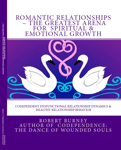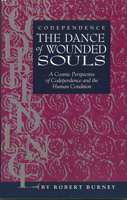
Codependence The Dance of Wounded Souls
“One of the false beliefs that it is important to let go of, is the belief that we need another person in our lives to make us whole. As long as we believe that someone else has the power to make us happy then we are setting ourselves up to be victims.
A white knight is not going to come charging up to rescue us from the dragon. A princess is not going to kiss us and turn us from a frog into a prince. The Prince and the Princess and the Dragon are all within us. It is not about someone outside of us rescuing us. It is also not about some dragon outside of us blocking our path. As long as we are looking outside to become whole we are setting ourselves up to be victims. As long as we are looking outside for the villain we are buying into the belief that we are the victim.
As little kids we were victims and we need to heal those wounds. But as adults we are volunteers – victims only of our disease. The people in our lives are actors and actresses whom we cast in the roles that would recreate the childhood dynamics of abuse and abandonment, betrayal and deprivation.
We are/have been just as much perpetrators in our adult relationships as victims. Every victim is a perpetrator – because when we are buying into being the victim, when we are giving power to our disease, we are perpetrating on the people around us and on ourselves.
We need to heal the wounds without blaming others. And we need to own the responsibility without blaming ourselves. As was stated earlier – there is no blame here, there are no bad guys. The only villain here is the disease and it is within us.” – quotes in this color are from Codependence: The Dance of Wounded Souls
I state in my book that codependence is a lousy word to describe the phenomena it has come to be associated with. A more accurate term would be outer or external dependence. We are programmed to give power over our sense of self worth – over how we feel about our self – to external sources and outside conditions.
Nowhere is the result of this programming more disastrous on a personal level than in the area of romantic relationships. Our subconscious and emotional programming started with fairy tales that taught us that when we meet our prince or princess we will live happily-ever-after. Movies and books and songs reinforced the original programming that in order to be whole and happy we must be in a relationship.
The result of this programming is that we are set up to feel like failures in romantic relationships. When we give power over how we feel about our self to another person in a romantic relationship we are practicing toxic love – making the other person our drug of choice, our higher power.
A healthy romantic relationship is an interdependent relationship – not a codependent one. An interdependent relationship is one where two people who have a healthy sense of Self worth, choose to become partners, to form a union. Two whole individuals – or more accurately (since as I have stated, we are all wounded and learning to access a True sense of self/Self worth) two people who are in recovery from their codependency working on owning their inherent worth and wholeness as beings, working on learning to be emotionally healthy and honest – who form an alliance / partnership with each other, not two half people who come together to feel whole.
In a healthy interdependent relationship as I mentioned in Chapter 9, we give the other person some power over our feelings – not over our self worth. Giving another person some power over our feelings is a completely different thing than giving them power over our self worth.
When we choose to give power away over our feelings we give the other person the power to help us feel happy. That also means we are giving them the power to hurt us. Caring for anyone or anything means we have an emotional investment in our relationship with that person or thing. To emotionally invest in a relationship is to take the risk of getting hurt – of getting our hearts broken – if we lose that relationship.
But it is not having our heart broken – it is not pure grief / emotional pain – that can be so debilitating, paralyzing, and agonizing when a relationship ends. It is the loss of self worth that we feel – the level to which we have invested, are dependent upon, the relationship to feel good about ourselves – that causes us to feel like we are going to die, that can make us feel like we want to die. The blame and shame and judgment caused by our codependency creates artificial feelings of inadequacy, of trauma, of agony. The unresolved abandonment / rejection / betrayal issues from our childhood are triggered and throw us into a place where we feel the hopelessness and powerlessness that we felt as a child.
The critical parent disease voice – old tapes / subconscious and conscious intellectual ego programming – tells us what losers and failures we are. The wounded inner child places react out of pain and shame from our childhood – the places within us where we feel unlovable and defective. We blame ourselves for the relationship ending with codependent messages like: if only I had not said that; I should have done that; I will never have a good relationship; I will always be alone; etc. Or we go to the other extreme and try to blame it all on the other person. People stalk and murder ex lovers because of the blow they feel they have suffered to their self worth – because they feel they have lost the source / drug that was making life bearable.
Getting our hearts broken is a normal and natural part of life. Blaming our self or the other person is codependency. The emotional pain of a heart break is very painful, but it gets better over time. The blame and shame of codependency causes us to be bitter and resentful, causes us to avoid relationships or to pick another person who will recreate our wounds – another person to try to fill the hole we feel inside of our self.
“Loving and losing is better than never loving” when all we experience is a broken heart. It is the blame and shame of the disease that makes us feel like failures who are incapable of loving – like a victim of our own unworthiness.
At the end of 1998, when I had reached a place in my recovery where I was secure in my self/Self worth, the Universe presented me with an opportunity to experience a romantic relationship in which my worst fear of rejection seemed to manifest – and I did not blame her or me. It was an incredible experience – very painful, but also very liberating.
“It Truly is a completely different experience to have a relationship where my self-worth is not at risk . . . . . if my self-worth is not at risk then another person can only add to me, they have no power to diminish me. What a gift.” – An Adventure in Romance – Loving and Losing Successfully
As that relationship was ending, before it ended, I wrote what I think is one of the most beautiful pieces I have ever written which I mentioned in a previous chapter and will include as the next chapter. It is called: A Wedding Prayer /Meditation on Romantic Commitment.
“You are not the source of each other’s Love. You are helping each other to access the LOVE that is the Source.
The Love that you see when you see your soul in the others eyes is a reflection of the LOVE that you are. Of the Unconditional Love that the Great Spirit feels for you.
It is very important to remember that the other person is helping you to access God’s LOVE within you – not giving you something that you have never had before.” – Chapter 20 A Wedding Prayer / Meditation on Romantic Commitment
Anytime we see another person as our source of love, we will feel a need to control and manipulate that person to be what we want them to be – to be there for us to feed off of emotionally so we can feel good about our self. There is nothing Loving about using another person emotionally because we do not know how to feed ourselves by accessing the True Source.
Love can feel magical and wonderful – can help us feel like we are soaring as the other person helps us to access the higher vibrational frequencies of Love and Joy. To have the opportunity to experience Love is one of the major reasons we have come into human body – but thinking a romantic relationship is what give us worth is codependent and dysfunctional. Romantic relationships can be wonderful opportunities for growth and Spiritual Awakening when we start seeing them realistically, when we stop allowing the perspective of the magical thinking romantic within us to dictate our relationship with romance.
“You are not going to live happily-ever-after once you find your prince or princess. There is no happily-ever-after on this plane of existence. You may find your prince or princess but they will have issues to deal with. Relationships are something that needs to be worked on – not some magic wand that makes everybody happy.” – Chapter 9 Interdependent, not codependent“
From Romantic Relationships ~ The Greatest Arena for Spiritual & Emotional Growth Chapter 19 – Taking self worth out of the Romantic equation

I am living on the Central Coast now (1/2020) and only doing myIntensive Workshops in Morro Bay at the moment.
If you don’t live in this area, there is a MP3 recording of my workshop that you can download.
 I have special offers for Romantic Relationships ~ The Greatest Arena for Spiritual & Emotional Growth on this page. (which includes offers for my other books also.)
I have special offers for Romantic Relationships ~ The Greatest Arena for Spiritual & Emotional Growth on this page. (which includes offers for my other books also.)
When you purchase Romantic Relationships ~ The Greatest Arena for Spiritual & Emotional Growth Codependent Dysfunctional Relationship Dynamics & Healthy Relationship Behavior through Joy2MeU you get a personally autographed copy;-) but you can also purchase through Amazon.com, Amazon.UK, or Barnes & Noble.
The Greatest Arena is also available as two ebooks (each only$9.95) eBook 1: Codependent Dysfunctional Relationship Dynamics & Healthy Relationship Behavior (the first 20 chapters of The Greatest Arena) is available on Amazon, on Amazon UK, on Barnes & Noble, or in Kobo format.
Romantic Relationships ~ The Greatest Arena for Spiritual & Emotional Growth eBook 2: Deeper Within (emotionally) & Further Out (metaphysically) From Fear of Intimacy to Twin Souls (chapters 21 through 40 of The Greatest Arena) is available on Amazon and Amazon UK, on Barnes & Noble, or in Kobo format.
Romantic Relationships ~ The Greatest Arena for Spiritual & Emotional Growth eBook 1: Codependent Dysfunctional Relationship Dynamics & Healthy Relationship Behavior now also available as an audio book on Audible, Amazon, and iTunes.
